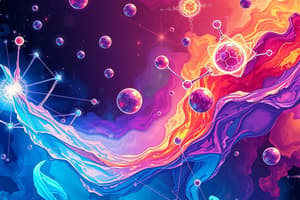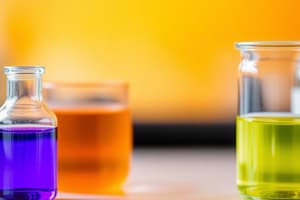Podcast
Questions and Answers
What is chemistry?
What is chemistry?
The study of matter, its properties, changes that matter undergoes, and the energy associated with those changes.
What is matter?
What is matter?
The physical material of the universe; anything that has mass and occupies space.
What are atoms?
What are atoms?
The almost infinitesimally small building blocks of matter.
What is a molecule?
What is a molecule?
What is a substance?
What is a substance?
Which of the following cannot be separated into simpler substances by chemical means?
Which of the following cannot be separated into simpler substances by chemical means?
What is a homogeneous mixture also called?
What is a homogeneous mixture also called?
Match the terms with their definitions:
Match the terms with their definitions:
What is a physical change?
What is a physical change?
What is a chemical change?
What is a chemical change?
What is energy defined as in the context of physics and chemistry?
What is energy defined as in the context of physics and chemistry?
Total Energy = ______ + Kinetic Energy
Total Energy = ______ + Kinetic Energy
Energy can be created or destroyed.
Energy can be created or destroyed.
Flashcards are hidden until you start studying
Study Notes
Introduction to Chemistry
- Chemistry is the study of matter, its properties, changes, and the energy associated with those changes.
- Matter is defined as anything with mass that occupies space.
Fundamental Definitions
- Matter: Physical material of the universe.
- Property: Characteristic that distinguishes a type of matter.
- Atoms: Tiny building blocks of matter.
- Molecules: Combinations of two or more atoms in specific shapes.
- Substance: Matter with a definite composition and distinct properties.
Classification of Matter
- Element: Cannot be separated into simpler substances by chemical means.
- Compound: Made of atoms from two or more elements, chemically united in fixed proportions.
- Mixture: A combination of two or more substances where each retains its identity. Mixtures can be homogeneous or heterogeneous.
- Homogeneous Mixture: Uniform composition throughout; also called a solution.
- Heterogeneous Mixture: Non-uniform composition.
Properties of Matter
- Physical Properties: Observable without changing the substance (e.g., color, odor, density, boiling point).
- Chemical Properties: Describe how substances may change or react (e.g., flammability).
- Intensive Properties: Do not depend on the amount of substance (e.g., temperature, melting point).
- Extensive Properties: Depend on the amount of substance (e.g., mass, volume).
Changes of Matter
- Physical Change: Changes appearance without altering composition (e.g., state changes).
- Chemical Change: Transforms substance into a different one, known as a chemical reaction (e.g., burning hydrogen).
Basic Concepts of Energy
- Energy is defined as the ability to do work, existing in potential and kinetic forms.
- Potential Energy: Energy due to the position of an object.
- Kinetic Energy: Energy due to the motion of an object.
- The total energy of an object is the sum of its potential and kinetic energy.
- Lower energy states are more stable and favored.
- Energy is conserved and can be converted from one form to another, never created or destroyed.
Studying That Suits You
Use AI to generate personalized quizzes and flashcards to suit your learning preferences.




